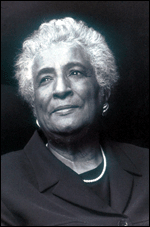 From the NY Times:
From the NY Times:
Constance Baker Motley, a civil rights lawyer who fought nearly every important civil rights case for two decades and then became the first black woman to serve as a federal judge, died yesterday at NYU Downtown Hospital in Manhattan. She was 84.
The cause was congestive heart failure, said Isolde Motley, her daughter-in-law.
Judge Motley was the first black woman to serve in the New York State Senate, as well as the first woman to be Manhattan borough president, a position that guaranteed her a voice in running the entire city under an earlier system of local government called the Board of Estimate.
Judge Motley was at the center of the firestorm that raged through the South in the two decades after World War II, as blacks and their white allies pressed to end the segregation that had gripped the region since Reconstruction. She visited the Rev. Dr. Martin Luther King Jr. in jail, sang freedom songs in churches that had been bombed, and spent a night under armed guard with Medgar Evers, the civil rights leader who was later murdered.
But her métier was in the quieter, painstaking preparation and presentation of lawsuits that paved the way to fuller societal participation by blacks. She dressed elegantly, spoke in a low, lilting voice and, in case after case, earned a reputation as the chief courtroom tactician of the civil rights movement.
Gov. George C. Wallace of Alabama and other staunch segregationists yielded, kicking and screaming, to the verdicts of courts ruling against racial segregation. These huge victories were led by the N.A.A.C.P.’s Legal Defense and Education Fund, led by Thurgood Marshall, for which Judge Motley, Jack Greenberg, Robert Carter and a handful of other underpaid, overworked lawyers labored.
In particular, she directed the legal campaign that resulted in the admission of James H. Meredith to the University of Mississippi in 1962. She argued 10 cases before the United States Supreme Court and won nine of them.
Judge Motley won cases that ended segregation in Memphis restaurants and at whites-only lunch counters in Birmingham, Ala. She fought for King’s right to march in Albany, Ga. She played an important role in representing blacks seeking admission to the Universities of Florida, Georgia Alabama and Mississippi and Clemson College in South Carolina.
I gave an oral argument before her once, and I saw her lecture several times. One hell of an interesting lady.
